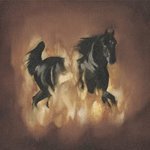
The Besnard Lakes The Besnard Lakes Are the Dark Horse
(Jagjaguwar)
Amalgamating the sound of a given era into a general heading seems like an arbitrary thing to do with any musical playground. But, as I douse in my own hypocrisy, I think everyone was listening to Brian Wilson over the holidays. Panda Bear, for one, has been greeting Pet Sounds all over the place.
One of the purveyors of this Spector-esque chain-link fence is the robust, lithium fed Dark Horse that stands as the symbol for The Besnard Lakes' sophomore recording. With their independently released debut quietly dusted under the carpet, the Jagjaguwar released Dark Horse has been gaining a reputation as their well-lauded premier effort. With the label more or less what Arts and Crafts was four years ago (albeit of course, that the label is based out of Indiana) the Besnard Lakes are aboard a gravy train of ripe, Canadian content: Black Mountain, Pink Mountaintops, Julie Doiron, Swan Lake and Ladyhawk. Featuring guest appearances from members of Silver Mt. Zion/Godspeed and Stars, The Besnard Lakes connect to Broken Social Scene in only two links - which is, formally, Canada's six degrees of Kevin Bacon.
Reigning with a majestically heavy gluten, the album's dark pull never asphyxiates its strength. The Expressionist style album art of a horse on fire articulates the looming power of every instrument that spans the album's diverse spectrum. Layered as though Wilson was mixing his infamous spatial complexion into the work, the story flows like a dreamlike reverie as the soul leaves the body. Melody is drowned in harmony, and not without the odd fauna sample ingested in the album's ornate shadows. When the violin's jerking, the vocals are soaring, and hastening tempos storm in with refulgence just as a collapse draws its teeth.
Heroic, monumental and wondrously sensual, the Dark Horse gallops across all corners of the board. The humid fog of Disaster rolls in with the gentle sun-kissed plea, "Baby, I've got some words for you." The progression then opens its doors to voluminous horns and whimpering strings with no lack of spacial fuzz. Pouring from every direction of aural infinity, For Agent 13 drops into that very abyss with a fleeting rain of sullen piano before the organ wafts into the dense, vocalized sky. As the tambourine passes the baton to a resolute drum knock, the guitar plucks like a rollercoaster up the track on route to a symphonic crescendo. This conquest is mirrored by the triumphant guitar climax of And You Lied to Me which leaves me pondering which concurrent Page year to name-drop.
Rides the Rails sombrely nods off Yellow House as the violin weeps atop more robust horn arrangements, beckoning an eventual departure from the forest to march into battle. Lasek even drops years of the Great War in For Agent 13, and in On Bedford and Grand he throws in the post-modern context: "You wouldn't believe the things we saw/When we took the hell train/The centre of culture/Capital." Majestic, steadfast, and yet somehow rolling with melodic worth, the album alludes prog-rock when it was time-bending psychedelia. Carrying a heavy undertow both symphonically and lyrically, this album is ripe with both sixties optimism and seventies disillusionment.
Not without the quivering horn arrangements of Nicole Lizee; the marriage (both figuratively and literally) between Jace Lasek's throttling operatives and Olga Goreas' subdued accents give this work a heavy yet spacial complexity. In encompassing rampant lingering, relentless breakthrough, and the foreshadowing in between with ominous and incendiary force - yes, The Besnard Lakes really are The Dark Horse.
28 February, 2007 - 22:54 — Tara Campbell